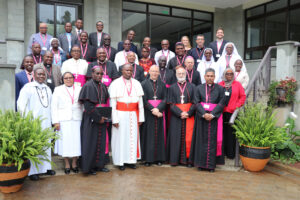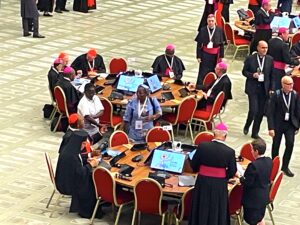VATICAN SYNOD: End of First Module of Synod Assembly: What’s The Experience of Participants?
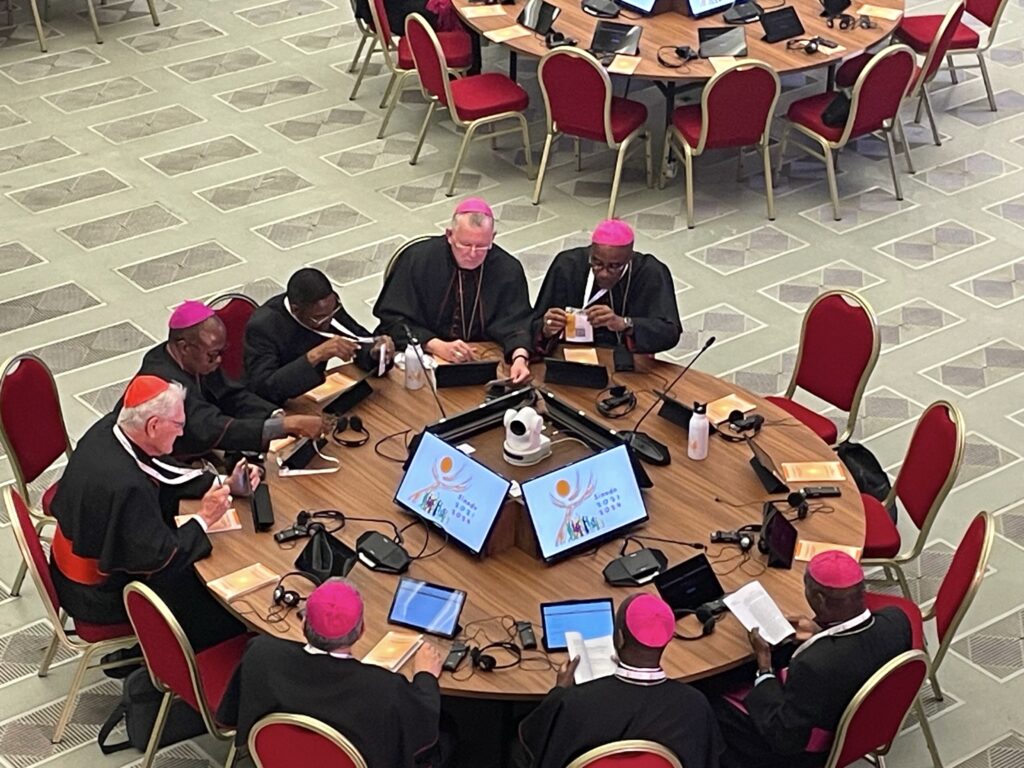
Fr. Andrew Kaufa SMM
One thing about this Synod, noted Cardinal Fridolin Ambongo of Kinshasa Archdiocese during the Saturday, October 7, press briefing, is that “In the Synod on Synodality, you do not know where you are going. In the past synods, you would know the outcome even before you came. But in this one, there is no agenda pre-arranged with solutions already pre-determined.
However, there is one thing that we know: it is that according to the same Instrumentum Laboris, the participants are now entering the second module whereby the conversation in the Spirit shall focus on the three priority issues of concern for the synodal Church as identified by particular continental assemblies (IL. Nos. 43ff).
Prayer, Silence, Spiritual Conversation
What started with the ecumenical prayer vigil on September 30 at Saint Peter’s Square, followed by a three days retreat from October 1 to 3 at Fraterna Domus in Sanfano, continues to define the synodal process at the universal level whereby participants are expected to build togetherness as representative of the universal Church: prayer, listening, and spiritual discernment.
Presiding over the opening mass at Saint Peter’s Square on October 4, again during the opening ceremony at Paul VI Hall, Pope Francis’ appeal was that the participants enter this stage with an understanding that it is a prayerful path of spiritual discernment where media fasting, listening to the Word of God and to one another are key to discerning what steps the Holy Spirit is calling the Church to take from now onwards.
Listening to one another in Working Groups, reporting to the General Congregation, and listening to interventions became the agenda of the assembly from Wednesday to Friday. Perhaps for the participants, one thing to note about this module is not so much the details in the continental reports but the practical experience of being a member of the Universal Church. This certainly came out strongly because of the composition of the Working Groups where people from different parts of the world came together to share their experiences of the synodal journey since October 2021.
Another striking experience at this stage is the prayerful mood. Firstly, each synod participant was asked to prepare by entrusting and disposing oneself to the attitude of listening to the word of God and to the Holy Spirit in personal silent prayer. After an hour or so of doing this spiritual exercise, each participant was asked to make space to listen to one another using the method of Spiritual Conversation.
The Instrumentum Laboris
As Pope Francis has emphasized more than once during the opening Mass and speech, the methodology is new to those who are used to the democratic parliament approach where individuals strive to convince others in order to push their agenda. Most of the participants especially from Africa were already oriented to the methodology of Spiritual Conversation at the meeting which was held at Mariapolis Retreat Centre in Nairobi. For those who missed the opportunity, the facilitators ensured that during this module of the synod assembly, everyone was oriented to the methodology.
The Instrumentum Laboris (IL) or rather the ‘Working Document’ for the 16th General Assembly of the Synod of Bishops released on June 20, 2023, has become the living document at this juncture of journeying together as a universal Church. For instance, on the importance of listening to the Word of God, Article no. 35 says:
This spiritual practice enables us to move from the “I” to the “we”: it does not lose sight of or erase the personal dimension of the “I”, but recognizes it and inserts it into the community dimension. In this way, enabling participants to speak and listen becomes an expression of liturgy and prayer, within which the Lord makes himself present and draws us towards ever more authentic forms of communion and discernment.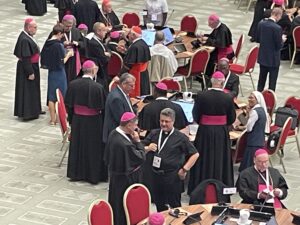
On listening to the Word of God, Article no. 36 of the IL reads:
In the New Testament, there are numerous examples of this mode of conversation. A paradigmatic account is provided by the account of the encounter of the Risen Lord with the two disciples on the road to Emmaus (cf. Lk 24:13-35, and the explanation given in CV 237). As their experience demonstrates, conversation in the Spirit builds communion and brings missionary dynamism. The two, in fact, return to the community they had left to share the Easter proclamation that the Lord is risen.
Again, on silent personal prayer Article 38 of the Instrument Laboris stresses its importance by arguing that it helps each individual person “to open up within himself or herself a space for others and for the Others.”
“Once again, each person takes the floor: not to react to or counter what they have heard, reaffirming their own position, but to express what from their listening has touched them most deeply and what they feel challenged by most strongly. The interior traces that result from one’s listening to sisters and brothers are the language with which the Holy Spirit makes his own voice resound,” reads Article 38.
A look at the Fruits of First Module
It follows then that if anything has been achieved so far, it is the fact that during the first module of the General Assembly of the Synod of Bishops – For a Synodal Church: communion, participation and Mission – these spiritual exercises combined with group works, have helped the participants from across the world to begin to look at themselves not as individuals Christians or as territorial entities but rather as representatives of their local Church within the context of a universal family of God.
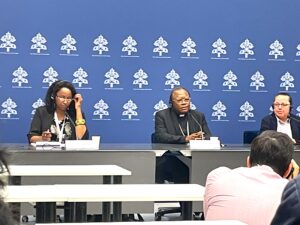 On this note Sr Laetitia Salazar ODN from the United States of America expressed on the October 7, press briefing that “To me this Synod is a different experience even from the General Chapters of Religious congregations where participants meet as members of one congregation. Here, we are meeting as participants from the different continents with diverse backgrounds.”
On this note Sr Laetitia Salazar ODN from the United States of America expressed on the October 7, press briefing that “To me this Synod is a different experience even from the General Chapters of Religious congregations where participants meet as members of one congregation. Here, we are meeting as participants from the different continents with diverse backgrounds.”
In this assembly where over 350 participants from different parts of the world have gathered to share about their experiences of being a ‘church’, they are all like the two disciples on the Emmaus journey Lk. 24:13-35, listening to the Lord and to each other in order to discern where their hearts burn from within.
This observation is further supported by the quality of the spiritual conversation emanating from the reports of the Working Groups to the General Congregation in that at the end, what the over 35 group rapporteurs share within 3 to 4 minutes, including the individuals’ interventions, the reports and interventions “… were meant to give well-reasoned record of consensus reached, and making explicit any divergencies.” Furthermore, a report “must be approved by an absolute majority who attest that the report faithfully represents the work of the Group.”
Looking to the Next Module
The Synod is turning out to be an expression that the Church is one body of Christ (Rom. 12:4-5) in the most practical terms. Therefore, as the second module begins, it is perhaps important to reiterate Pope Francis’ appeal for prayers for the success of this assembly. This appeal is more pertinent now as the assembly enters the second module where focus turns on the three key points of the Synod on Synodality: communion, participation and mission. The second module is an opportunity for the participants to embrace the same universal nature of this gathering and ask themselves how best to be more fully a sign and instrument with God and with all humanity (IL no. 46); how best to share the gifts and tasks in the service of God; and what processes and structures are more appropriate for the mission of Jesus Christ in the modern times.

